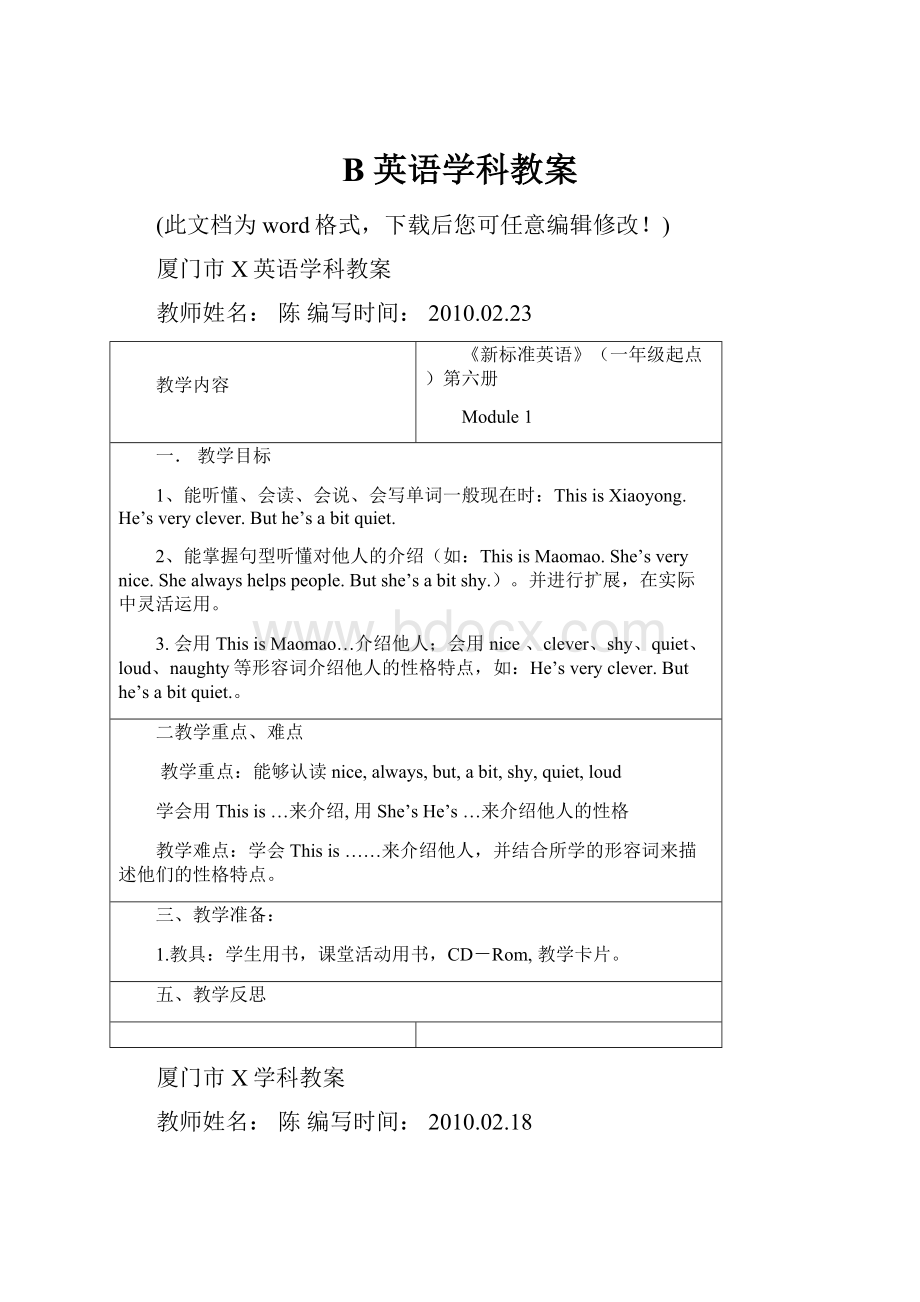B 英语学科教案Word格式文档下载.docx
《B 英语学科教案Word格式文档下载.docx》由会员分享,可在线阅读,更多相关《B 英语学科教案Word格式文档下载.docx(18页珍藏版)》请在冰豆网上搜索。

厦门市X学科教案
2010.02.18
Module2
一教学目标
1、能听懂、会读、会说、会写会介绍风景名胜的名称和特点(如:
ThisisBigBen.It’sverytall.)或会描述某一场景(如:
Thisriverisverywide.Andit’sverylong.)。
2、能掌握句型能够看图读出课文中带有黑体单词的句子以及活动2中的本课主要句式。
.
1.教学重点:
1学习描述英国名胜的单词:
LondonEye,BigBen,RiverThames及描述场所的形容词:
tall,old,long,wide,high,new,round
学会用这些句型:
Thisis+地点名词,It’s+形容词
学会用:
Thisis+地点名词,It’s+形容词来介绍英国名胜。
四、教学过程
Step1:
Warmup:
Ss:
Singsongs.T:
Goodmorningboysandgirls.
GoodmorningMissHong.
Step2:
Revision;
SayasIdo,notasIsay
T:
I’mtallanddotheoppositeaction.
You’renottall,You’reshort.
I’mfatanddotheoppositeaction.
You’renotfat,You’rethin.Etc.
Step3.Presentation
Welldone!
Now,lookatthesepicture.
showapictureoftheYangtzeRiver.ThisistheYangtzeRiver.Teach“river”.Eg.River,river,thisistheYangtzeriver.It’sverylongandwide.Teach“wide”.Thenshowsomepictures.Forexample:
atelevisiontower,anewpencile-box,anoldbook,aroundclockinturn.Teachtheseadjectivewords.High,New,old,round.
Step4:
T:
TodayAmyandLinglingwillintroduceacitytous.Canyouintroduceacitytous?
Step5:
…Listentothetapeandanswerthequestion.Whichcityaretheyintroducing?
Thenteach“London”
Step6:
Showthreepicturesandsomeadjectivewords.
TheRiverThames,BigBen,theLondonEye.
Listenagainandfindouttheanswers.
1.WhatarethesymbolsinLondon?
Whatisitlikerespectively?
Step7:
ListenandMatch
river,long,wide
S1’sgoingtopickoutthepicture.
S2’sgoingtopickoutthewords.
Sssaythewholesentence.Thisriverisverylongandwide.Etc.
Step8:
writedownthesewords;
rivershowthepictur
《新标准英语》(一年级起点)第五册
Module3
1、能听懂、会读、会说、会写听懂他人的周末计划(如:
Whatwillyoudothethisweekend?
Idon’tknow.Maybewe’llgotothezoo.I’llvisitmygrandpainthecountryside.)。
1.2、能掌握句型能够正确抄写黑体单词和带有黑体单词的句子。
2.引导学有余力的学生能够结合本课主要句式进行知识运用的练习活动,例如选出正确的单词填空.
二教学重点、难点
一、教学重点:
复习动物的的单词:
tiger,panda,lion,pig…
学习主要语言结构:
用We’ll…,Willyou…?
Yes,Iwill.No,Iwon’t.描述将要做的事并会询问他人的打算。
复习由所展示的两幅图来谈论它们的不同。
然后玩“Simonsays”的游戏
OK,todaywearegoingtolearnModule3,Unit1.Maybewe’llgotothezoo.Readafterme.
…
你们知道吗?
AmyandDamingaretalkingabouttheirweekend.
Listentothetape.
NowlistenagainandthinkaboutwhatwillAmygoattheweekend?
Whatwillshesee?
WillSamgo?
…
Nowlistentothetapeandrepeat.
Listenandrepeat.
Listenandsaythesentencesinactivity2.
Listenandsay.
Homework:
1.Listenandrepeatthetext.
*2.ReciteM3U1
本模块主要学习动词的一般将来时,课文虽然短,但学生对will的朗读似乎有点拗口,课文无法朗朗上口。
动词的一般将来时学生不理解,对他的使用方法更是一窍不通。
虽然课堂上反复的强调,但他们仍然理解不透。
时态的使用和朗读方面有待加强和提高。
Module4
1、能听懂、会读、会说、会写单词听懂他人关于未来职业的问答(如:
Whatwillyoubeinthefuture?
MaybeI’llbeawriter.)
2、能掌握会用“Whatwillyoube?
”询问他人的理想;
会用“MaybeI’llbea…”表达自己未来可能从事的职业.
二.教学重点、难点
1.教学重点:
学习有关职业的词汇:
writer,policeman,footballer,及future,policestation
2.学会谈论职业的句型:
Whatwillyoube?
MaybeI’llbea…
He’ll…She’ll…
能够询问及表达自己或他人将来想要从事的职业。
Presentthetask:
ThisisMssmart.
She’saniceteacher.Talkingabout
Yourfriendsoryourfamily’s
members.
1.
Introduceindividualstudents
totherestoftheclass.
Thisis[name].
Example:
ThisisTom.
He’sShe’saniceteacher.
Teachthewords:
writer,
future,policeman
Makealist.
Daming,Lingling,Amy,Sam
Afootballer,filmstar,policeman,
writer
2.
Sayabouteachones’one'
sideal。
3.
UsingMaybeI’llbeawriter..
e.pIam…I’llbea…
Pairwork
MaybeI’llbea…
1.Listentothetaperecorderand
repeat.
2.Sayaboutyourideal
usingthe“MaybeI’llbea…
3.ActivityBookP14
1.
Listenandrepeat3times(M4,
Unit1).
*2.Talkaboutyourideal.
Step9:
本模块主要学习动词的一般将来时。
谈论长大后想当的职业。
学习在经过M3将来时的学习后,对将来时有一定的了解,他们对将来时的用法和读音都有一定的基础,所以学习起来比M3来有很大的进步。
学习对职业名称也很感兴趣。
但对astronaut读起来拗口,学生掌握得较差。
学生对Whatwillyoube?
MaybeI’llbea…的句型操练得较到位,总体来说,课文掌握得不错。
2010.04.26
Module5
一.教学目标
1、能听懂、会读、会说、会写单词thousand,kilometer,might,million,place,building.
2、能掌握句型会用“Willyoupick…?
”询问他人想摘什么水果并能用“Yes,wewill.No,wewon’t.”作出相应的回答
二.教学重点、难点
会用“Willyoupick…?
”询问他人想摘什么水果并能用“Yes,wewill.No,wewon’t.”作出相应的回答。
使用一般将来时谈论将来发生的事情:
Willwepickoranges?
No,wewon’t.Butwewillpickpeaches.。
教师出示一张果园的图片
What’sthis?
……..
Itisafruitfarm
Let’sgotothefruit
farm.Lookthereaeso
manyfruittrees
复习以前学过的几种水果
Lookatthetrees.
Willyoupickapples?
Whatwillyoupick?
以此引导学生使用
Yes,IwillNo,
Iwon’t.I’llpick…..”回答
1.…Listentothetaperecorderandanswer
Somequestions:
“whatwilltheypick?
Willtheypickapples?
Willtheypickpears?
Willtheypickoranges?
Willtheypickpeaches?
2..ActivityBookP19Ex3
2.Listenandrepeat
1.Listenandrepeat3
times(M5Unit1).
2.ActivityBookP18Ex1
*ReciteM5U1
本模块主要学习动词的一般将来时和数词13—10。
对于将来时,相信在理解概念、规则和运用上几乎一窍不通,他们只会死记硬背,生硬的套用句型Willwepick_______?
Yes,wewill.No,wewon’t.但即使是生硬的套用,在发音上仍然十分的拗口,而且十分的不熟练。
因此此句型有待进一步训练和加强,同时在句型的运用上也需要花更多的时间。
而数词学生掌握较好,只是在四会掌握时,记忆方面有待提高。
Module6
1、听懂人的工作、平常学习表现情况及询问他人情况的表达。
2.能看图读出课文中带有黑体单词的句子以及活动2中的例句。
1.一般进行时第三人称单数,例:
Heworks,are的用法
3.四会单词的掌握
4.听懂人的工作、平常学习表现情况及询问他人情况的表达。
能询问和介绍某人的学习情况。
能看图读出课文中带有黑体单词的句子以及活动2中的例句。
。
Reviewsomeadj.:
good,bad,naughty,clever,nice,shy,loud,quiet,
Task,Ssanswer.
Is’t.
Pairworkandpractice.
2.Istothetaperecorderand
answerSomequestions.
2.Listenandrepeat5times.
3.ReadM6U13times.
4.Readagainandraisesome
questionsyoudon’tknow.
3.Listenandrepeat3
times(M6Unit1).
4.Recitethenewwords.
*ReciteM61
本模块的形容词good,bad,naughty,clever,nice,shy,loud,quiet,helpful,lazy等学生掌握不错,特别是句型Ishe…?
yes\no.学生均能套用句型并灵活运用。
而且他们对运用句型描述同学很感兴趣。
课文的朗读有点拗口,不是很流利,但基本上还能较通顺的朗读下来。
四会单词的记忆仍然是一个需要解决的问题。
Module7
1、能听懂、会读、会说、会写单词会说short,long,fat,thin,tall,old,young以及相关的表达,如:
Hewasfatthen.Now..
2.能够说出课文中带有黑体单词的句子以及活动2中的例句。
听懂介绍别人的特征和状况(如:
short、long、fat、thin、tall、old、young)。
会说short,long,fat,thin,tall,old,young以及相关的表达,如:
Hewasfatthen.Now.
能够说出课文中带有黑体单词的句子以及活动2中的例句
First,let’splaya“please”game.Ifteachersayplease,studentsdotheaction.IfTdonotsay,thenSskeepquiet.
Ipreparesomepicturesoffamousmenorcartoon,andletthestudentsdescribe.
Forexample:
Heisverytall.Sheisverythin.Thecatisveryfat.
showthepictureoflittleLingling,
Doyouknowwhoisshe?
…T:
OK,todaywearegoingtolearnModule7,Unit1.Theywereveryyoung.Readafterme.
NowAmyistalkingwithLingling.Let’slistentothetapeandseewhoisshe.
Sowhoisshe?
S1:
SheisLingling.
Nowlistenagainandthink:
AreLingling’sgrandparentsyoungnow?
IsLingling’stothetape.
SoareLingling’sgrandparentsyoungnow?
No.
IsLingling’s’tyoungnow,sotheywereveryyoung.引出“were”
.were
.Theywereveryyoung
teaching“was,weren’t,wasn’t
Listentothetapeagainandfindoutthesentenceswith“were,weren’t,was,wasn’t”:
reviewsomeantonyms,forexample:
”long--short”“tall--short”“fat--thin”“young--old”
Memory.
passthecardstostudents
findoutthepartnersintheshorttime.
…thenchangethecards
《新标准英语》(一年级起点)第二册
Module8
2、能掌握句型TellmemoreabouttheGreat